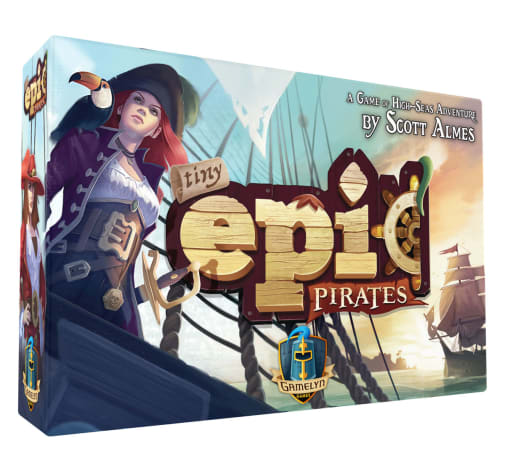You can experience the life of a pirate in this game as the goal is to build up your wealth with gold and bury your treasure. Players will perform actions such as plundering settlements, attacking other ships, searching the sea for valuables and more as they try to increase their treasure. The first player that can create enough wealth and bury three treasures wins the game! This is an enjoyable strategy game more geared toward teenagers or adults. Comes in a small and compact case that can easily be transported as this is a game you’ll want to play continuously with friends. For 1-4 players with a 45-minute playtime.
Tiny Epic Pirates Game
SKU
037610
Grade 9-AD
These icons are designed to help you quickly understand and learn important information about our products.
Teaching Method
Traditional
Teacher-centered curriculum commonly used in classrooms that may include a text, teacher manual, tests, etc.
Charlotte Mason
A methodology based on the work of a 19th century educator who maintained that children learn best from literature (Living Books), not textbooks.
Classical
A methodology based on the Latin Trivium (three stages of learning), including the grammar stage (memorization and facts), logic stage (critical thinking), and rhetoric stage (developing/defending ideas).
Unit Study
A thematic or topical approach centered around one topic that integrates multiple subject areas.
Montessori (Discovery)
A methodology based on the work of a 20th century educator that emphasizes student and sensory-driven discovery learning and real-life applications.
Other
Other methodologies
Religious Content
Secular
Contains content contrary to common Christian beliefs (i.e. evolution).
Neutral
Avoids religious or theoretical topics or presents multiple viewpoints without preference.
Christian/Religious
Faith-based or including instructional religious content.
Learning Modality
Auditory
Learns through listening, talking out loud or reading out loud.
Visual
Learns through seeing, prefers written instructions and visual materials.
Kinesthetic/Tactile (Hands-On)
Learns through moving, doing and touching.
Multi-Sensory
Curriculum that employ a variety of activities/components.
Presentation
Sequential
Curriculum progresses through well-defined learning objectives. Emphasizes mastery before moving to the next topic.
Spiral
Topics and concepts are repeated from level to level, adding more depth at each pass and connecting with review.
Conceptual/Topical
Focus is on the “why,” often with a unifying concept as well as specific skills; coverage may be broader.
Teacher Involvement
Low Teacher Involvement
Student-led materials; parent acts as a facilitator.
Medium Teacher Involvement
A mix of teacher-led time and independent student work.
High Teacher Involvement
Teacher-led lessons; may utilize discussions, hands-on activities and working together.
Additional Materials Required
No other materials needed
Everything you need is included.
Other Materials Required
There are additional required resources that are a separate purchase.
Other Materials Optional
There are additional resources mentioned or recommended but are not absolutely necessary.
Consumable
Consumable
Designed to be written in; not reusable.
Non-Consumable
Not designed to be written in; reusable.
Our Price
$30.00 $30.00 $22.95
Rainbow Savings: $7.05
Description
Category Description for Tiny Epic Games
Tiny Epic Games features many different fun and interesting strategy
games players will want to keep playing. One of the great parts about these
games is the variety of themes and gameplays that players can experience. From
working as a dinosaur rancher to building your own galactic empire, there are
many exciting game themes to choose from. Each game follows its own unique
gameplay and will involve a decent amount of strategy, making it perfect for
older kids or adults. Also, these games come in small enough packaging that
makes them portable and easy to bring to a game night. Have fun strategizing
and trying to outthink your opponents as you explore the different worlds of
Tiny Epic Games!
Details
| Product Format: | Other |
|---|---|
| Grades: | 9-AD |
| Brand: | Gamelyn Games |
| EAN/UPC: | 728028493184 |
| Length in Inches: | 4.75 |
| Width in Inches: | 7 |
| Height in Inches: | 1.625 |
| Weight in Pounds: | 0.85 |
Videos
Reviews

